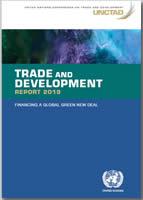
The deep and widespread economic and social damage caused by the global financial crisis has been followed, in most advanced economies, by a decade of austerity, sluggish productivity growth and stagnant real wages. Growth has also slowed in most developing countries, albeit with considerable variation across regions. The struggle to create good jobs has intensified, with rapid urbanization, premature deindustrialization and rural stagnation accompanying rising inequality and growing political tensions.
Everywhere, anxiety over the prospect of increasing economic insecurity is compounded by the impending threat of environmental breakdown. The Intergovernmental Panel on Climate Change has recently raised the stakes by starting the clock on a climate meltdown; but a shortening time horizon is just part of a growing recognition of a wider and deeper ecological crisis.
Efforts to address these challenges have aligned around a series of goals and targets, which the international community agreed in 2015, to ensure an inclusive and sustainable future for all people and the planet. But with little more than a decade left to achieve Agenda 2030, meeting these goals has already fallen behind schedule and there is broad agreement that what is now required is a coordinated investment push on an unprecedented scale and across the entire global commons. The financing numbers are daunting, from “billons to trillions”, requiring an additional 2.5 trillion dollars a year, just in developing countries, on UNCTAD estimates.
A decade ago at the G20 gathering in London, the world’s major economies came together to stem the global financial panic triggered by the collapse of the sub-prime mortgage market in the United States and to establish a more stable growth path going forward. Their talk of a fresh start was an acknowledgement that the existing multilateral system had failed to provide both the resources and the coordination needed to underpin stable markets and a healthy investment climate.
A decade on, that effort has stalled, leaving those tasked with meeting the SDGs wondering whether the multilateral system is fit for purpose. Their concern is compounded by the deteriorating state of the global economy. Increased disagreements over trade rules, currency movements and technology flows are fostering uncertainty and instability, draining trust from the multilateral system at the very moment consensus and coordination are key to scaling up the resources needed to meet the massive economic, social and environmental challenges we all face.
This year’s Trade and Development Report suggests that meeting the financing demands of the Agenda 2030 requires rebuilding multilateralism around the idea of a Global Green New Deal, and pursuing a financial future very different from the recent past. The place to begin building such a future is with a serious discussion of public financing options, as part of a wider process of repairing the social contract on which inclusive and sustainable outcomes can emerge and from which private finance can be engaged on more socially productive terms.

Secretary-General of UNCTAD


